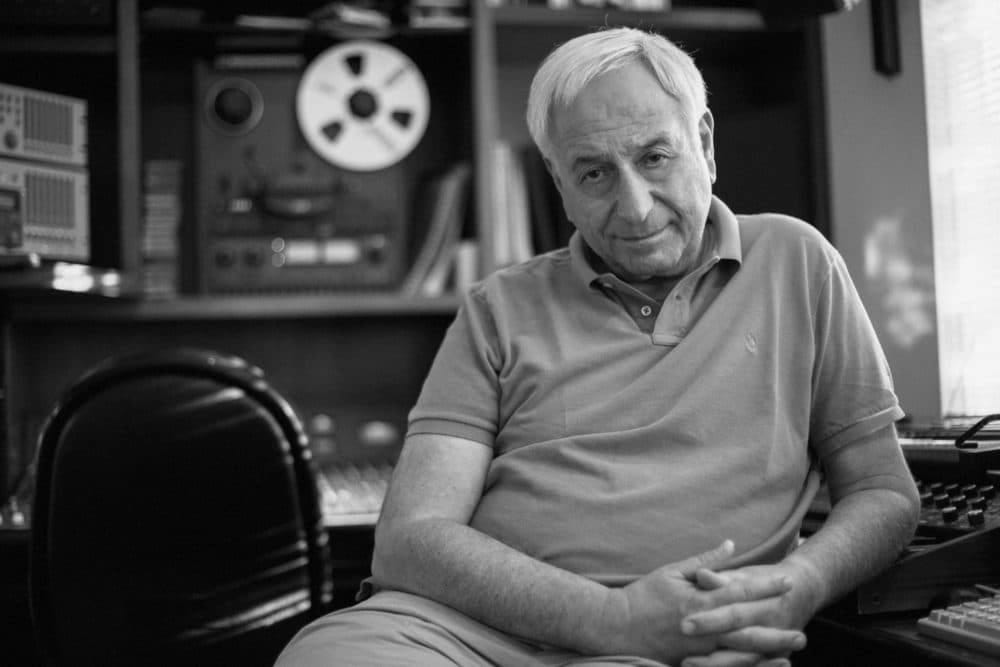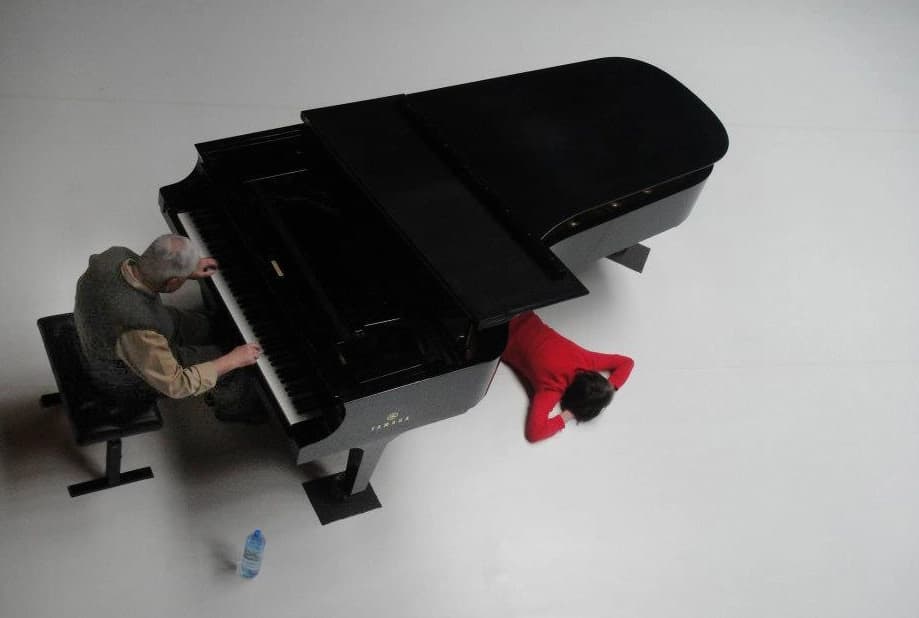
articles / Interviews
Real Time Composing with composer William Goldstein
Kate Drabczynski
William Goldstein is an acclaimed composer, pianist, and innovator whose career spans film, television, and concert music. Discovered by Berry Gordy in 1975, he became a Motown recording artist and later scored over 50 film and TV projects, including Fame, The Miracle Worker, and Twilight Zone. Goldstein is renowned for his unique gift of “Instant Composition”, creating complete works spontaneously in live settings.
Mr. Goldstein shares how he discovered his talent for composition and how he inspires those who may want to learn how to compose in real-time in this Q & A.
How did you first discover your ability to compose music in real time, and when did you realize it was something unique?
I grew up in a nonmusical family, no piano in the house but my folks were in the hotel business, and during the summer we lived in the summer hotel in Belmar New Jersey, where there was a piano in the ballroom. I'm told when I was 3 or 4 I would go to the piano and start experimenting. By the time I was 8 years old, and mind you I never had piano lessons, I could go to the movies and come back and play themes and whatnot that just stuck with me. Around this time I would also just sit and improvise. I can't claim that these improvisations were particularly compositional because I don't remember any of them. They were neither recorded nor notated. When I was 9 I was brought in to see Prof. Raymond Burrows at Columbia University Teachers College. One of the leading piano pedagogues, and respected educators of the day. That visit is captured in both this article that Teachers College published in 2022.
As well as this video where I returned to Teachers College to recount my childhood experience for an upcoming documentary.
Interviewed at 9, Teachers College, Columbia University 1952
You often describe music as a language you were born speaking. How does that perspective shape your approach to spontaneous composition?
When we speak the spoken language, we do not have to instruct our tongue where to go in our mouth to make a sound. We do not have to format sentences in our mind before we speak them. We are able to do all of this in real time. My fingers over a keyboard are like the tongue in my mouth, I do not have to tell them where to go to express myself in the language of music. For me this is completely natural. When I give master classes in the creative process I can make students aware of skills needed so that they can improve their access to their creativity. However a gift is a gift. For me it's a very humbling gift and I didn't realize how special it was until 2011, which was the first time I realized that not every composer had this facility.

Courtesy of William Goldstein's website
Your album First Impressions and others showcase your solo improvisations. How do you prepare for recording sessions like these?
First impressions is a collection of pieces that were created over many months. I didn’t decide to sit down and record an album. Many of these pieces were the first musical portraits I created by having guests pick 3 notes on the keyboard, from which I subsequently created a piece from those selected notes, which became the beginning of the melodic line which would I then developed into a composition. I put this album together when I thought I had enough material that I really liked, and wanted to share. The album came out in 1999, and Sirius XM immediately picked up and continues to play to this day Daydreams. Many of my subsequent albums are also collections of these musical portraits based on 3 notes selected by the subject.
You’ve performed live improvisations based on audience-selected notes. What do those interactions reveal about the shared nature of creativity?
When I create a piece before an audience it's a very humbling experience for me, because the emotional connectivity these pieces seem to have, not only the person who selects the 3 notes, but to others in the audience as well, is beyond my comprehension. Perhaps there's some additional connectivity that happens when an audience knows that they are witnessing the creation of a composition. I see it consistently and am always surprised by I will share two videos of small groups of 20 to 30 people who came to my home for chamber concert. You can see the audience reactions and the Q&A's afterwards are very revealing.
Here's a 3 note piece created before a very large audience, at the Berlin January 2024 concert.
Berlin Solidarity Concert - Andrea's 3 Note Musical Portrait / Instant Composition
Can you share a moment from a performance or collaboration where Real Time Composition led to something unexpected or deeply moving?
This happens countless times. The first collaborative composition album In The Moment, created with James DiPasquale, contains an amazingly complex composition that came out after a week of recording. Looking for Kije, obviously a nod to Prokofiev, is a compositional tour de force created in real time.
Another wonderful example was filmed while it was being created. Movement for Violin and Piano.
Movement for Violin & Piano - Pei-Wen Liao, William Goldstein Created in Real Time
You’ve said that composers like Bach and Mozart were improvisers. What do you think we’ve lost in modern composition, and what are you trying to revive?
Most of the 18th and 19th century composers all created in real time effortlessly. The countless stories are legendary.
Modern composition is an entirely different question. In centuries past you had to be a wunderkind to have a career. In the early 20th century you can see that the belief in both painting and music was that in order to establish yourself as an artist you had to be unique and different from all that which came before you. This pushed the envelopes in the art world to chaos as represented by Jackson Pollock, Schoenberg leaving his early music behind tried and succeeded in creating a world where every note was equal to every other, and John Cage often, completely left everything to chance. The response to all of this in both the art and music worlds was minimalism.
We have to remind ourselves that technique is a means to an end it is not the end itself. Bach perhaps the greatest of all was considered to be an old fogey by his contemporaries. He didn't come up with anything new, he just created the most heavenly music in the world. I'm a champion of emotional connectivity, often through melodic techniques, but not always. In a study of all of the arts, music, painting literature cinema, the commonality that exists in all works that endure over centuries is the emotional connectivity of the work. The ability of the creator to connect with the noblest parts of our being and inspire us to be better than we ever dreamed we could be.
How do you teach Real Time Composition to students? What exercises or mindsets help them unlock their own spontaneous creativity?
As previously stated, a gift is a gift that cannot be taught only shared. However the techniques of creating in real time can be taught. They are building a vocabulary of your art so that you can access it effortlessly, and perfecting the technique of your instrument so that you can express yourself effortlessly in real time without being "tongue-tied". I often start student with a very simple exercise. Get away from the keyboard, get away from your instrument. I'll have one student pick 3 random notes that are given to another student who attempts to take those notes and try to create an 8 bar phrase. A linear melodic line. When you master that you can consider the keyboard and try to think linearly. Most people think vertically coming up with chords upon which they will write melodies or textures. Bach on the other hand was a linear composer line over line, which is what makes great counterpoint.
Looking ahead, how do you hope Real Time Composition will influence the future of music education and performance?
When I'm writing a composition, like my recent opera, the process is conventional you take the ideas put them down and you work them out. Your mind is totally involved. Creating in real time I often think we bypass the mind completely.
When you can develop real time skills they can aid you in coming up with spontaneous ideas that bypass the mind and with modern technology you can record those ideas. There are sections of my opera that were created that way, and then hammered out.
The most important thing I urge performers to do, particularly when playing repertoire, is to try to make the audience feel like they're hearing this composition for the very first time.
I will conclude by sharing with you HOMAGE: Krzysztof Penderecki , Created in Concert at the Chopin Festival in New York City in 2021. I was asked to create a real-time composition based on a 4 note theme by Penderecki, who early in his career pushed envelopes and in his later years used his formidable technical skills to create in my opinion more emotionally connective work.
HOMAGE: Krzysztof Penderecki, Created in Concert by William Goldstein
You may also be interested in reading my arts manifesto published in the Los Angeles times in 1996: Making Art Passionately.





